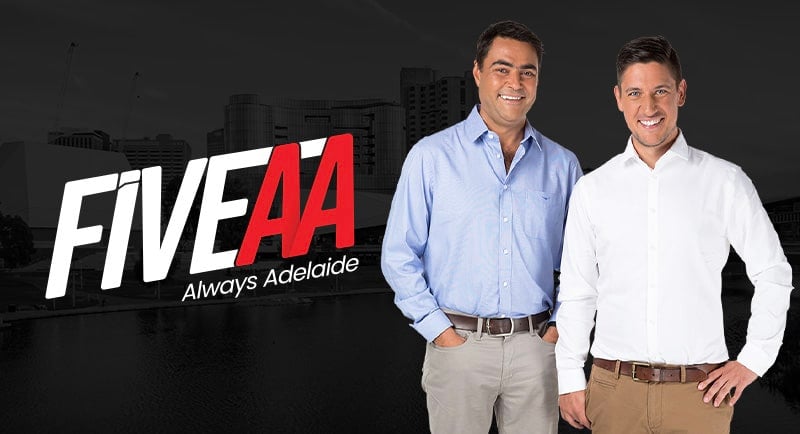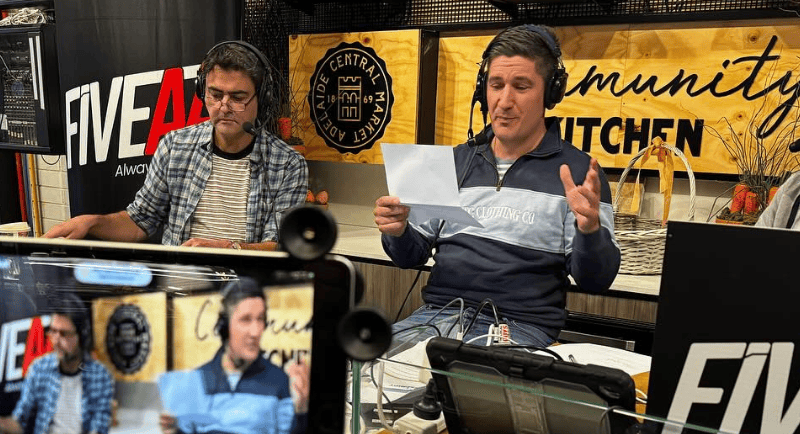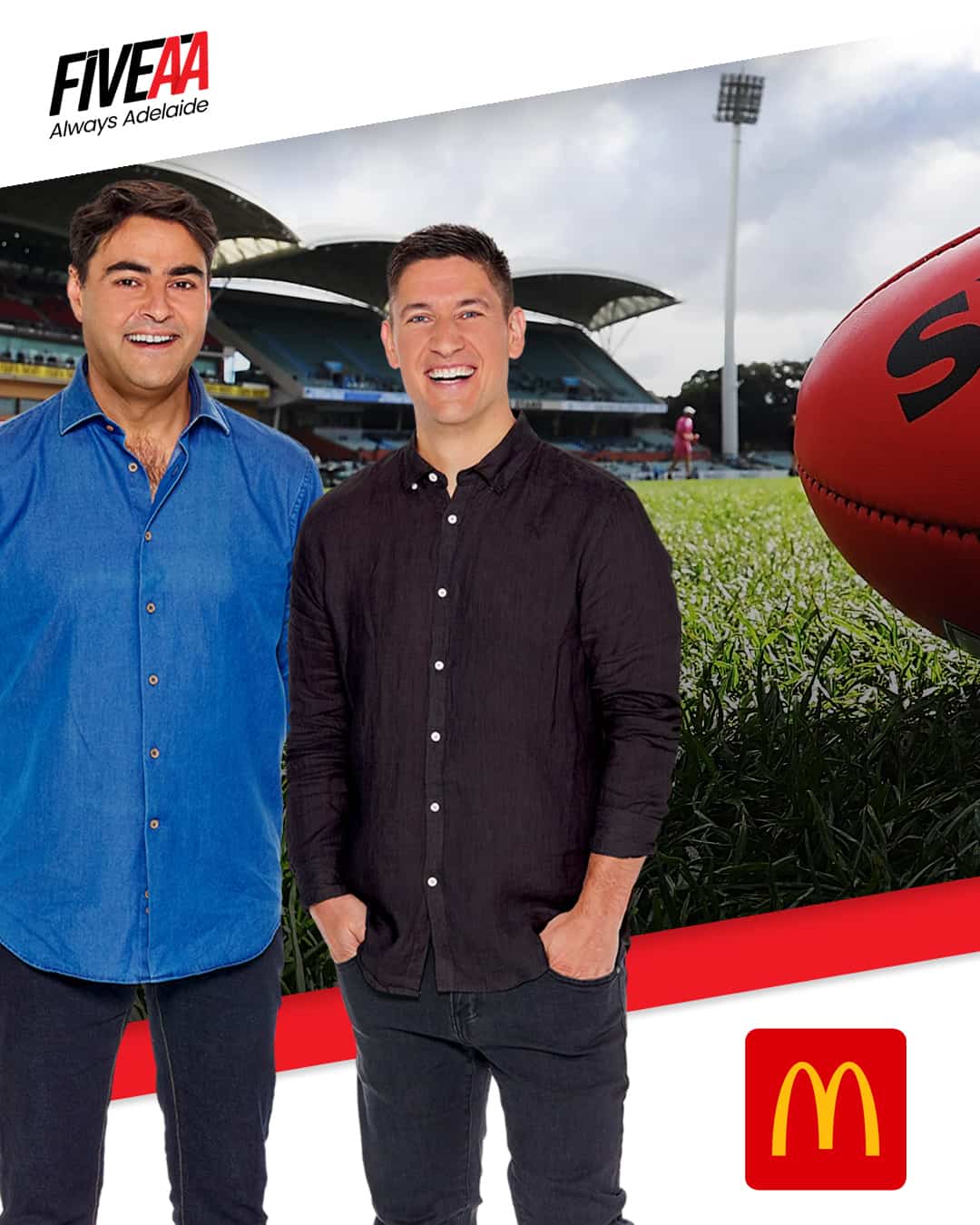Nova Entertainment’s FIVEAA has long been the Adelaide breakfast AM champ. Later this year, David Penberthy will pass a milestone that not many breakfast shows get to celebrate. He will have been on air in the timeslot for 10 years. Will Goodings joined him as co-host the following year.
In GfK Survey 1, 2024, David and Will were comfortably #1 AM in their timeslot. The program’s share was well ahead of the station average. The show was only outrated by one Adelaide FM station – Triple M.
Mediaweek visited the FIVEAA breakfast show on a busy Thursday morning in what is probably the biggest week of the year in Adelaide – AFL Gather Round.
David meets Will
When discussing how the AM #1 Adelaide breakfast show might have changed over the decade, Penberthy offered: “It has got more news content now than it had.”
Goodings added: “It was an angrier show when we first started. It was initially more interview-based. We were two people who didn’t know each other well at the start. We had no experience of working together.
“There were more interviews with politicians and they tended to be at times antagonistic. These days we have built so many more segments into the show. That gives us more freedom without having a rigid interview format across the morning.”
Penberthy: “The news cycle changed a lot over the past nine years. We started at the end of a long period of Labor rule. There were a lot of problems facing the government.
“These days South Australia’s economy is doing well compared to other states. We had an easy path through Covid-19 compared to elsewhere. We’ve got a stable [state] government which apart from some challenges is doing a lot right.
“At the moment people feel really happy about living in Adelaide. They know how hard and expensive life is in Melbourne and Sydney. The show reflects that people are happy with their lot here.”
Alan Jones wouldn’t rate at FIVEAA
Penberthy said what works elsewhere in radio could bomb in Adelaide.
“If you came into FIVEAA and pretended you were Alan Jones, no one would listen to you. The idea that you could start the show by ranting and raving about how the city is a dysfunctional dump. And that no one in the government has any idea of what they are doing. That wouldn’t gel with the mood of the audience.”
Goodings: “Things have changed here after two years of Covid restrictions. The appetite of our audience for hard news changed. There was then a bit of a backlash against news. Now it feels like we are returning to a natural level where peoples’ engagement with the news cycle has allowed us to be newsier.”
Identity crisis at ABC
The topics that David and Will tackle range from long-form political analysis, to short and sharp quiz segments. Penberthy explained something that might be helping them at present.
“The ABC nationally seems to be having an identity crisis in the talkback space. In the past ABC Radio has been regarded as having something of a monopoly on political analysis in this town.”
Penberthy was speaking on the day Matthew Abraham joined the hosts for an in-depth discussion about the latest in state politics.
Penberthy continued: “Matt was for a long-time part of ABC Adelaide’s #1 breakfast show with David Bevan. We have been working with him for several years and that challenges the presumption that people make about going to the national broadcaster to get intelligent political discussion.
“The liberating thing about working at a station like FIVEAA is you can say whatever the hell you want. Based on our read of what the listeners are saying, we can confidently call something a failure or a triumph in politics. Without worrying whether there is going to be a house committee meeting about whether we have gone too far.”
Understanding ratings success
After nearly a decade together, Penberthy and Goodings have some understanding of the measurement system. And why their numbers might fluctuate at times.
Goodings: “We can’t identify ratings movement as well as stations on the FM band can. They can track the relationship that promotions have with cume especially.
“The nature of a talk radio listener is they are often listening for most of the day. We can see ebb and flow because of the news cycle.”
Penberthy: “I don’t know why we go well. But I think I know why we go poorly sometimes. You tend not to worry about anything when you are going well. You just hope you keep going well.”
He identified two periods where the show has struggled most in the ratings. “The first was the end of Covid, people were sick of hearing about it. There was a split of maybe 50/50 of people who thought we needed to open the borders as a matter of urgency. Then there were those who wanted them staying shut to keep the infected hordes from the east out.
“Our view was we can’t stay under the doona forever. Let’s get this show on the road. A lot of our older listeners were alarmed. Even angry by that position.”
The Voice was a turn-off for some
“The other thing that hurt us was that Adelaide’s northern suburbs, where much of our audience is, returned the highest ‘No’ vote in The Voice referendum.
“Many of our listeners not only didn’t like the idea of The Voice. They got sick and tired of even hearing about it.
“[Some days] it might have been just an item in the news and Will and I didn’t discuss it. Some listeners thought they were paying $7 for a punnet of blueberries while these two halfwits were rabbiting on about The Voice.”
Goodings: “We don’t lose a listener like they do at an FM station when they hear something they don’t like. They just don’t listen as long. The strength of our ratings is time spent listening (TSL).
“The secret for us is to ensure the audience is engaged with the show for as long as humanly possible.”
FIVEAA competition
When pushed about where the FIVEAA audience might go when they look for an alternative, Penberthy kept it in-house. “They might go to something like smoothfm.”
What about Triple M? “Some might go there. It might be some of The Voice people. The one thing you’re not going to get on Triple M is anyone talking about politics.”
Goodings noted the ABC and Triple M are the competition. “But in very different ways. Triple M for sport, and the ABC for news. We try to cover both those things at the same time which is a balancing act.”
Side hustles
In addition to hosting FIVEAA breakfast, both hosts are in demand elsewhere.
Penberthy is a South Australia correspondent for The Australian. He admitted he is probably writing a little less for the masthead now than he was previously. “Often we are doing something on breakfast when I think it would make a good piece for The Australian.”
Two News Corp newspapers get weekly columns from him too. He writes a state column for The Advertiser on Fridays, then a nationally syndicated column for News Corp Sunday tabloids.
Penberthy turned his attention to his colleague. “In terms of side hustles, Will is your man.” [Laughs]
Goodings was previously presenting the local sport on Network 10 Adelaide. “That was a casualty of Covid,” he explained, “when they moved the local broadcast away.”
He then moved from sport on 10 to co-presenting Seven’s 6pm Adelaide news. A bulletin that has been a ratings champ for several decades.
“Seven have been very accommodating about what my daily workload is like. It’s not that extraordinary. It’s just that the middle of my day is like the end of most peoples’ days.”


